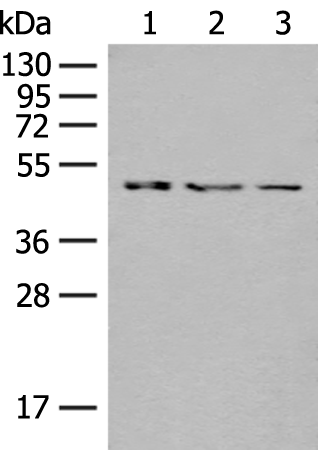
| WB | 咨询技术 | Human,Mouse,Rat |
| IF | 咨询技术 | Human,Mouse,Rat |
| IHC | 咨询技术 | Human,Mouse,Rat |
| ICC | 技术咨询 | Human,Mouse,Rat |
| FCM | 咨询技术 | Human,Mouse,Rat |
| Elisa | 1/5000-1/10000 | Human,Mouse,Rat |
| Aliases | GCD; ACAD5 |
| WB Predicted band size | 48 kDa |
| Host/Isotype | Rabbit IgG |
| Antibody Type | Primary antibody |
| Storage | Store at 4°C short term. Aliquot and store at -20°C long term. Avoid freeze/thaw cycles. |
| Species Reactivity | Human, Mouse |
| Immunogen | Fusion protein of human GCDH |
| Formulation | Purified antibody in PBS with 0.05% sodium azide and 50% glycerol. |
+ +
以下是关于GCDH抗体的3篇代表性文献摘要:
1. 《Generation and characterization of monoclonal antibodies against human glutaryl-CoA dehydrogenase》
作者:H. Mohsen et al.
摘要:报道了针对人类GCDH蛋白的单克隆抗体制备及特异性验证,证明该抗体在Western blot和免疫组化中可特异性识别重组及天然GCDH蛋白。
2. 《Immunohistochemical localization of glutaryl-CoA dehydrogenase in human tissues》
作者:J. Kölker et al.
摘要:通过自研多克隆抗体系统研究GCDH在不同组织的表达分布,发现该酶在中枢神经系统和肝脏中高表达,为研究戊二酸尿症病理机制提供依据。
3. 《Development of a rapid immunoassay for glutaryl-CoA dehydrogenase deficiency screening》
作者:M. Rodríguez-Pombo et al.
摘要:建立基于单克隆抗体的ELISA检测方法,实现新生儿GCDH酶活性快速筛查,与传统质谱法相比灵敏度达92%,特异性达98%。
注:实际应用中建议通过PubMed(PMID检索)或Web of Science平台获取完整文献信息。如需特定研究方向的扩展文献,可补充说明具体应用场景(如诊断/机制研究/结构分析等)。
The GCDH (Glutaryl-CoA Dehydrogenase) antibody is a crucial tool for studying the enzyme encoded by the GCDH gene, which plays a vital role in mitochondrial amino acid metabolism. GCDH catalyzes the oxidation of glutaryl-CoA to crotonyl-CoA in the degradation pathways of lysine, hydroxylysine, and tryptophan. Deficiencies in GCDH activity are linked to glutaric acidemia type 1 (GA1), an autosomal recessive disorder characterized by toxic accumulation of glutaric acid and 3-hydroxyglutaric acid, leading to neurological damage, particularly in infancy.
GCDH antibodies are widely used in research to detect and quantify GCDH protein expression in tissues or cell lines, aiding in the study of GA1 pathogenesis, enzyme function, and metabolic dysregulation. These antibodies are essential for techniques like Western blotting, immunohistochemistry, and immunofluorescence, enabling localization of GCDH within mitochondria. They also support diagnostic applications, including confirming suspected GA1 cases through protein expression analysis.
Structurally, GCDH is a homotetramer, and antibodies targeting specific epitopes help identify mutations or post-translational modifications affecting enzyme stability or activity. Species-specific GCDH antibodies (e.g., human, mouse) facilitate cross-species comparative studies. Ongoing research leverages these antibodies to explore therapeutic strategies, such as gene therapy or enzyme replacement, to address GCDH deficiency. Overall, GCDH antibodies are indispensable for advancing both basic and clinical insights into mitochondrial metabolism and related disorders.
×